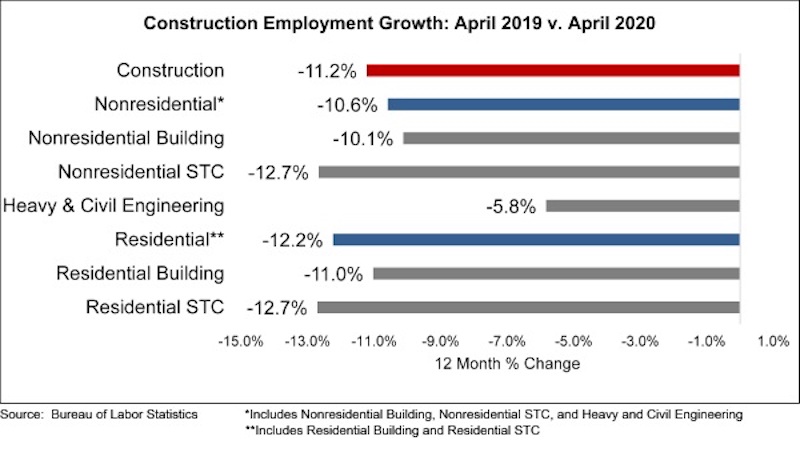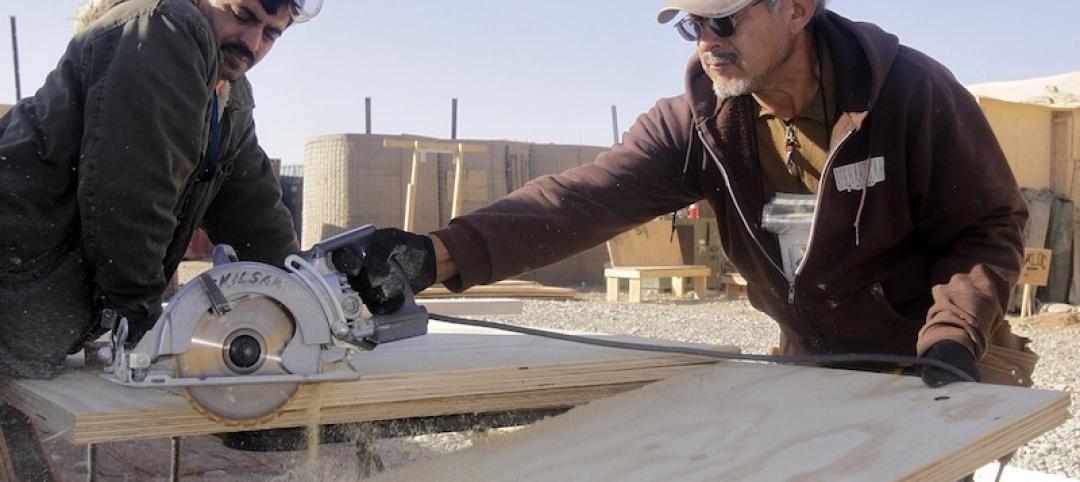The construction industry lost 975,000 jobs on net in April, according to an Associated Builders and Contractors analysis of data released today by the U.S. Bureau of Labor Statistics. This was the largest recorded decrease in construction jobs since the government began tracking employment in 1939, despite construction remaining an essential industry in much of the nation through April.
Nonresidential construction employment lost 560,500 jobs on net in April. There were job losses in all three nonresidential segments, with the largest decline registered among nonresidential specialty trade contractors, which lost 393,100 jobs. Nonresidential building lost 88,500 jobs, while heavy and civil engineering lost 78,900 jobs.
The construction unemployment rate was 16.6% in April, up 11.9 percentage points from the same time last year. Unemployment across all industries rose from 4.4% in March to 14.7% last month. This was the highest rate since the BLS started tracking unemployment in 1948. Because of technical reasons related to the BLS survey and a classification error in several responses, the unemployment rate is probably closer to 20%.
“The hope had been that construction activity would hold up well given the industry’s classification as an essential industry in much of the nation and the presence of substantial backlog coming into the crisis, which stood at 8.2 months in February, according to ABC’s Construction Backlog Indicator,” said ABC Chief Economist Anirban Basu. “But alas, in large measure, those hopes were not realized. The level of construction industry job loss in April easily surpassed that of the worst month sustained during the Great Recession, when 155,000 jobs were lost in March 2009. Between April 2006 and January 2011, construction industry employment declined by 2.3 million. The construction industry lost nearly a million jobs last month alone.
“Based on a combination of business confidence indicators, initial unemployment claims and other emerging data, May will represent another month of crushing construction employment loss,” said Basu. “Project postponements and cancellations are now commonplace, with construction backlog failing to be the protective shield that it normally is during the early stages of economywide recession.”


Related Stories
Market Data | Jul 28, 2020
For the fourth consecutive quarter, Los Angeles leads the U.S. hotel construction pipeline at the close of Q2’ 20
New York City continues to have the greatest number of projects under construction, with 106 projects/18,354 rooms.
Market Data | Jul 28, 2020
6 must reads for the AEC industry today: July 28, 2020
St. Petersburg Pier reconstruction completes and post-pandemic workplace design will not be the same for all.
Market Data | Jul 28, 2020
Senate Republicans' coronavirus relief measure includes provisions that will help hard-hit construction firms recover
The HEALS Act includes essential liability, workforce, financial & unemployment reforms, but association will work to get needed infrastructure investments included in final relief measure.
Market Data | Jul 27, 2020
6 must reads for the AEC industry today: July 27, 2020
Customized labs give universities a recruiting edge and the U.S. construction pipeline remains robust through the first half of 2020.
Market Data | Jul 27, 2020
The U.S. construction pipeline remains robust through the first half of 2020, despite pandemic
Projects currently under construction stand at 1,771 projects/235,467 rooms, up 3% and 1% respectively, YOY.
Market Data | Jul 24, 2020
5 must reads for the AEC industry today: July 24, 2020
North Carolina will stop relying on FEMA flood mapping and Cal Poly Pomona's newest project.
Market Data | Jul 23, 2020
New LEED guidance from USGBC helps cities and communities expand resilience efforts in response to the COVID-19 pandemic
Credits integrate public health and social equity with sustainability planning.
Market Data | Jul 23, 2020
6 must reads for the AEC industry today: July 23, 2020
Skanska selects Pickard Chilton to design new ofice tower and days grow long at nursing homes as virus lockdowns drag on.
Market Data | Jul 22, 2020
6 must reads for the AEC industry today: July 22, 2020
Phase one of Toronto's The Orbit detailed and architecture billings remains in negative territory.
Market Data | Jul 21, 2020
Nonresidential building spending to decline through 2021
The commercial building sector is expected to be the hardest hit.

















